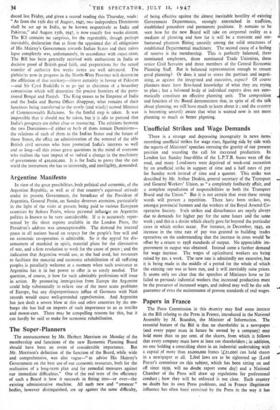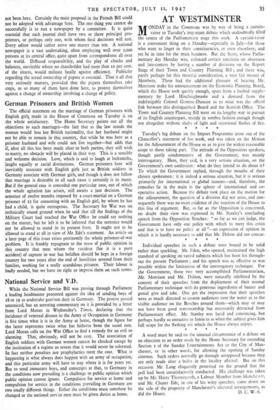Papers in France
The Press Commission in this country may find some interest in the Bill relating to the Press in France, introduced in the National Assembly by M. Bourdan, the Minister of Information. The essential feature of the Bill is that no shareholder in a newspaper (and every paper must in future be owned by a company) may hold more than to per cent. of the shares, from which it follows- that every company must have at least ten shareholders ; in addition, no one holding a controlling share in an industrial undertaking with a capital of more than ro,000,000 francs (£21,000) can hold shares in a newspaper at all Libel laws are to be tightened up (Lord Porter's committee on this subject, which has been sitting on and off since 1939, will no doubt report some day) and a National Chamber of the Press will draw up regulations for professional conduct ; how they will be enforced is not clear. Each country no doubt has its own Press problems, and in France illegitimate influence has often been exercised by the Press in the way it has-
not been here. Certainly the main proposal in the French Bill could not be adopted with advantage here. The one thing you cannot do successfully is to run a newspaper by a committee.. It is quite essential that each journal shall have two or three principal pro- prietors, or perhaps only one, with whom final decisions will rest. Every editor would rather serve one master than ten. A national newspaper is a vast undertaking, often employing well over 2,000 pexsons at its central office, quite apart from correspondents all over the world. Diffused responsibility, and the play of checks and balances, inevitable where no shareholder had more than to per cent. of the shares, would militate fatally against efficiency. Publicity regarding the actual ownership of papers is essential. That is all that very seriously matters, provided that the papers themselves take steps, as so many of them have done here, to protect themselves against a change of ownership involving a change of policy.



































 Previous page
Previous page